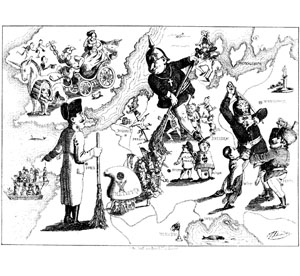4. Summary of the Spring of Nations. “Tidying Europe” caricature from 1849
Questions
Description and Analysis
- Assign relevant nationality to characters that are "cleaning" Europe.
The caricature shows European rulers eliminating the effects of revolutionary movements that took place in their countries in 1848 and 1849. They can be identified by the countries against which they are depicted on the map and characteristic elements of their costumes. In the North, we can see Frederick William IV wearing a typical uniform of the Prussian army. In the South, Franz Joseph and tsar Nicholas I are working together. Louis Bonaparte is cleaning France. Queen Victoria is shown against the background of the British Isles. However, she looks at the cleaning from her carriage. - What nations, according to your knowledge and the presented illustration, required "cleaning up" (calming and pacifying)?
Frederick William IV eliminates the democratic ambitions of the Frankfurt Parliament in the German states and pacifies the Poles in the territories annexed by Prussia. Tsar Nicholas helps Francis Joseph to suppress the Hungarian uprising because the letter ruler needs to supress the liberation movement of Poles in Galicia, Italians in Apennine Peninsula, and Slavs in the Austrian part of the Balkans. Even Austrians in Vienna needed "tidying".
Geographical/Historical Context
The Spring of Nations achieved the biggest successes in 1848. Authorities of many countries were forced to grant citizens political freedoms and introduce new solutions regarding the most sensitive social issues (especially related with so-called peasant issue).
In France, the government of the Second Republic decided to abolish censorship, legalize public assemblies, and introduce a number of solutions beneficial for workers (limitation of working hours to 10, the launch of public works).
In Prussia, Frederick William IV, under the pressure of demands to liberalize the country system, announced the constitution including a catalogue of guaranteed citizens' rights. Additionally he agreed to initiate Frankfurt Parliament, which was supposed to discuss the issue of the unification of German states.
The course of events and tempory successes of the revolution in Italy and the Habsburg Monarchy were mentioned in the materials of the content pages 2 and 3.
But the first turmoil quickly passed. The monarchs, previously forced to succumb to the demands of rebel communities, gained a bit of time to regroup forces. Their offensive from 1849 led to effective suppression of the democratic and national movements in all the countries of the continent.
In France, the elected president Louis Napoleon Bonaparte gradually restored the authoritarian system in order to announce the France an Empire again in 1851.
In Germany, Friedrich Wilhelm IV was humiliated by the offer of the German crown received from the Frankfurt Parliament (and not from the German dukes). As a consequence he broke up the assembly and cancelled the constitution and all the liberal civil rights that were included there.
In Austria, Franz Joseph, who was unencumbered with obligations made by his predecessor, did not intend to maintain the concessions previously enforced. With the help of Russian tsar Nicholas I, he crushed the Hungarian uprising and brutally pacified their aspirations for independence. He left equally few illusions about the possibility of obtaining political freedom to Poles, Czechs, Serbs, and Croats. Their joint Slavic Congress in Prague was simply broken up.
The Spring of Nations did not change the political situation on the Apennine Peninsula. National republics were abolished by armies from Austria and France (in case of Rome) and went back under the dominion of the old dynasties.
The lasting effects of the Spring of Nations were the manumission reforms that were conducted in the Austrian Empire. In other countries, where land ownership was previously regulated, revolution accelerated the process of emancipation of peasants and influenced the development of their political consciousness.
However, despite the elimination of the revolutionary movement and restoring the conservative regimes in all these countries, it cannot be said that the Spring of Nations had no permanent results. It constituted a breakthrough in the process of building national consciousness in countries in East-Central Europe. It also contributed to shaping a sense of community in the German and Italian states. Influence of citizens on the national issues increased. Especially the bourgeoisie increased their privileges in this area. The labour movement showed its power. Authorities started to take postulates of labour parties into account.
The Spring of Nations did not change the political map of the continent. But the awareness of the societies left indelible traces that triggered processes which at the beginning of the next century led to collapse of the old monarchies and the birth of modern Europe of Nations.
Links
http://encyklopedia.pwn.pl/haslo.php?id=3945094 – encyclopaedic explanation of the term nationalism.
http://wyborcza.pl/1,75517,659111.html – interesting article about the use of nationalist threads in the communistic propaganda after 1945.
http://www.kaczmarski.art.pl/tworczosc/wiersze_alfabetycznie/kaczmarskiego/j/jesienna_wiosna_ludow_1989.php – song by Jacek Kaczmarski (a Polish poet called "the bard of Solidarity”) which compares events in Central and Eastern Europe in 1989 to the Spring of Nations from the nineteenth century.





Presentation
Although the Spring of Nations covered almost all European countries, it eventually ended up with failure everywhere. Neither the Italians nor the Germans succeeded in uniting their countries, though they made such attempts. Prussian king Frederick William IV and Emperor Franz Joseph were initially forced by the liberal social revolutions to make concessions in Reich and Austria, respectively. Ultimately, they withdrew from these concessions. In France, a republic was introduced for a short time. Soon Louis-Napoleon Bonaparte brought back the empire. Independence aspirations of Poles, Hungarians, Czechs, Serbs, and Croats were suppressed by joint efforts of Austria and Tsar Nicholas I of Russia. This does not mean, however, that the balance of events from 1848 and 1849 was negative. Demands of freedom, equality and unity could be drowned out for a while, but from then on they would not be ignored. The demands were repeated in subsequent years and led to: unification of Italy (1866), unification of Germany (1871), and collapse of the Habsburg (1918) and Romanov (1917) monarchies.